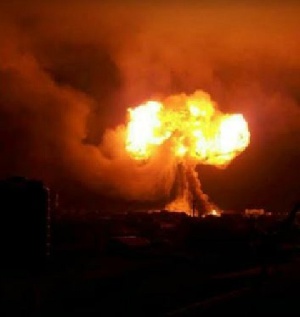Statistics available at the Ghana National Fire Service (GNFS) reveals that the Upper East Region has recorded a reduction in fire cases by 30 in the first quarter of 2018 as compared to the same period in 2017.
In the first three months of 2018, the Region recorded 107 fire cases including 47 in January, 31 in February and 29 in March as against 137 fire cases with 48 in January, 44 in February and 46 in March within the same time last year.
“In January this year, we recorded 23 domestic fire outbreaks, two vehicular fire cases, three electrical fire cases, five commercial fire outbreaks, 12 bushfires and two others. In February, 16 fire cases recorded were domestic fires, two vehicular cases, three electrical cases, five commercial cases, four bushfires, and one other case, while in March, 16 cases were domestic, two were vehicular, one being industrial, two electrical, three commercials, three bushfires and two others.”
Mr Douglas Koyiri, the Upper East Regional Assistant Chief Fire Officer, made these disclosures when Mr Edwin Ekow Blankson, the National Chief Fire Service Officer, interacted with him and his team in Bolgatanga.
The visit was to interact with the fire service personnel and find out their concerns and educate them on some measures put in place to improve the operation of the Service.
Mr Koyiri, who is also the Regional Commander of the GNFS, stated that the Region recorded about 311 fire cases in the whole of last year and his outfit was determined to reduce fire cases, hence the establishment of fire stations had been increased to 14.
He however indicated that the lack of transport in the Municipality and the various District Assemblies hindered the effective operation of the Service.
The Regional Commander appealed for the renovation and refurbishment of the personnel quarters and bungalows to make them conducive for human habitation, adding “the personnel staying there compete with reptiles, but they have to maintain their stay to avoid the place being invaded by squatters.”
Whilst asking for increment in the fuel coupons to the Region and resources to have the lands at Yarigabisi, Kumbosco and Bukere to be properly documented, the Assistant Chief Officer lamented the rate of personnel transfers from the Region, and said, “not less than 14 senior officers have been transferred from this Region without replacement and it is affecting our operation especially with the increase in the number of fire stations.”
Responding to the concerns of the Regional Commander and his subordinates, Mr Blankson assured them that lots of transformation has been done and strategies were still in place to transform the Service.
He said the service was making paradigm shift in its fight against fires from “soaking of the fire to precision”, adding that interventions such as construction of training school for personnel, which was almost completed, more fire service tenders and appliances, hydraulic platforms among others would be procured to build the confidence, skills and knowledge of personnel to deliver effectively.
The Chief Officer disclosed that government had given clearance for about 10000 protective clothes which would be shared to every personnel and said this would enable the personnel discharge their duties smoothly.
He revealed that personnel who applied for reimbursement of their medical expenses since 2007 to date would soon be paid as all outstanding issues have been resolved and said strict directives have been given to the district and regional directors to ensure compliance.
Whilst tasking the personnel to honour their responsibilities with diligence and patriotism to the country and avoid corrupt practices, Mr Blankson advised them to eschew politics in the discharge of their duties.
Regional News of Wednesday, 18 April 2018
Source: ghananewsagency.org
Upper East records 107 fire cases in first-quarter
Entertainment












